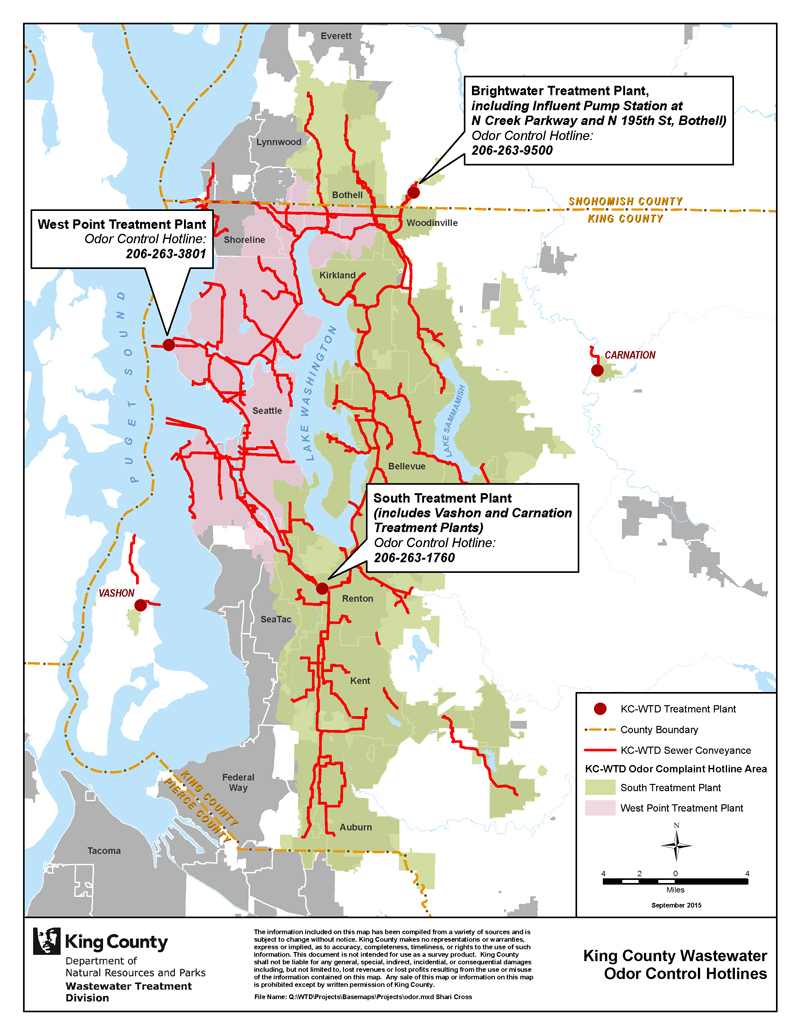Report odor problems
Find 24-hour contact numbers and information to report odor problems coming from King County’s wastewater treatment plants or facilities.
Contact one of our treatment plants right away if you smell a bad odor. Scroll down for tips on telling the difference between bad smells coming from the wastewater treatment process versus the environment and how to report an odor problem.
Smell something?
What’s the best thing you, as our neighbor, can do if you smell something bad—even if you’re unsure what it is or where it’s coming from? Tell us about the smell: Call one of our 24/7 odor control hotlines right away if you smell something so our operators can track down the source. Every odor control complaint is logged and tracked, and plant operators make it their goal to identify and respond to odor issues within 2 hours.
Brightwater Treatment Plant(includes influent pump station at
24-hour odor control hotline: |
West Point Treatment Plant24-hour odor control hotline: |
South Treatment Plant(includes Carnation and Vashon plants) 24-hour odor control hotline: |
Other agency contactsPuget Sound Clean Air Agency: |
What’s that smell?
King County is committed to keeping smells from the wastewater treatment process under control. We use state-of-the art odor control equipment at our regional treatment plants and pump stations to help keep bad smells that may result from the wastewater treatment process at bay. However, we can’t guarantee there will be no odors in our existing system all the time.* Occasionally, equipment will need to be shut down for cleanup, preventive maintenance, or repairs, which may cause brief periods of time when the air could be a little stinky.
*The exception to this is our Brightwater Treatment Plant, where we are committed to “no odor” standards agreed to in our permits.
What do we mean by “stinky”? Different parts of the wastewater treatment process create different bad smells. For example, wastewater in sewer pipelines produces hydrogen sulfide gas, which smells like rotten eggs. This is the smell most often associated with sewage, and it’s most noticeable where the wastewater enters the treatment plant. It’s also more noticeable during the summer, when warm days coincide with prevailing wind patterns in our area.
Other parts of the treatment process, such as where the solids are separated and dewatered to produce biosolids, create strong smells of nitrogen and ammonia. People with sensitive noses might even be able to pick up smells like cat urine and rotting cabbage that are produced in even more areas of the treatment process.
How can you tell?
The truth is, it’s hard to tell exactly where a bad smell is coming from. For example, while bad smells associated with the wastewater treatment process are more common during summer months, so are bad smells from our region’s natural areas. The decaying seaweed and sea lettuce that wash up on beaches around Puget Sound every August are a big source of hydrogen sulfide—the same smelly compound in sewage—and winds can carry the bad smell far and wide. These decaying vegetation on our beaches also produce dimethyl sulfide, which smells like rotting fish.
Bad smells can also come from industrial sources in our region. Rending plants and garbage transfer stations near South Plant Treatment Plant, in particular, sometimes produce bad smells. Or, bad smells can even come from residential sources, such as fertilizer products used on a neighbor’s lawn. Even if you’re unsure what an odor is or where it’s coming from, call our 24/7 odor control hotline right away.
Tell us all about it
Before you call, here are some things you can do to help us track down the bad smell:
- Try to pinpoint an address or source of the bad smell. It could be coming from local sewers or King County’s system. Many King County sewer maintenance holes have “METRO” on the lid. If the smell is coming from a local sewer, call your local sewer agency.
- Ask your friends and neighbors if they’re experiencing a similar bad smell. All the complaints we get are important, but it’s a strong indicator when lots of people are smelling the same thing. This also helps us know that it’s not an isolated incident.
- Be prepared to describe the bad smell in detail, including the time you first noticed the smell and the location. The more information we have, the better!

 Translate
Translate
